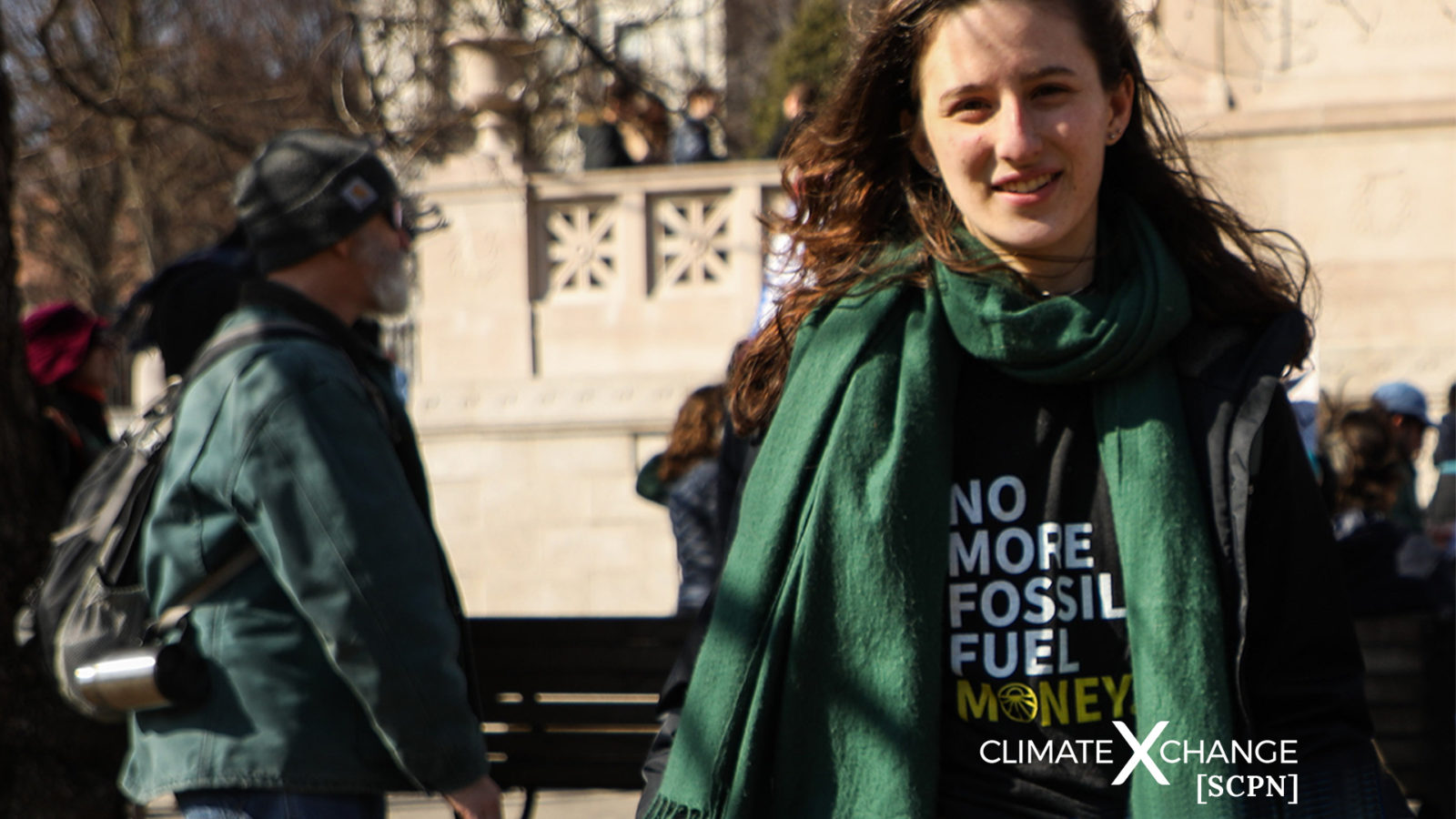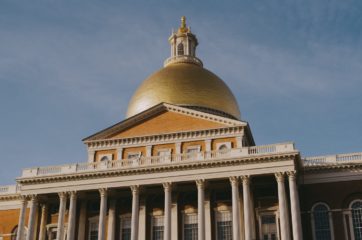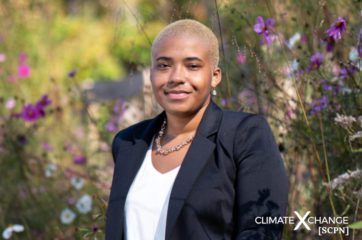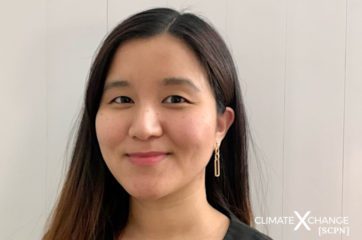All across the country, members of our State Carbon Pricing Network (SCPN) are fighting to make an impact on climate change in their communities. We have individuals in our Network from all 50 states, each experiencing climate change differently in their local areas and finding unique solutions to build resiliency efforts.
This week, we spoke with Anya Flood Taylor, a biochemistry student who became involved in climate policy after cofounding a chapter of the Sunrise Movement, a youth-led climate activist group, on her own college campus.
Carlie Clarcq
Hi Anya, thank you so much for making the time to speak with me today. I’m very excited to learn more about you and what you do!. Can you tell me more about yourself, and describe what first got you interested in the climate crisis?
Anya Flood Taylor
I’m from the Hudson River area of New York, and the Hudson River is very polluted. My town is right on the river, and our waterfront can’t be built on because of toxic PCPs. Growing up, I’ve always had sustainability units in my classes, and we would always go to the water and learn how to filter it. It was just something that I grew up knowing about, but I didn’t really understand the actual systemic effects of climate change. I just knew that pollution existed and it was affecting my community.
Carlie Clarcq
Yeah, absolutely. I think that’s something we’ve seen with the younger generation — the impacts of climate change and the knowledge that pollution negatively affects the world around us is something that is more intrinsic, whereas for older generations, climate change is something they maybe just recently have begun to understand.
Anya Flood Taylor
Right, yeah. So for me, as I got older and went to school in Boston, I learned more about climate change and the environment, and what that really means. I study biochemistry, and I’ve taken a very scientific perspective to the issue and have learned about the effects of climate change in that way. By learning about the deeply concerning effects of climate change and its implications in our future, I felt the weight of that on my own future, and my peers future’s, and my children’s futures. Not really knowing what to do with that feeling of powerlessness, I heard about the Sunrise Movement.
I remember first hearing about (Sunrise) when there were big headlines about them sitting in at Nancy Pelosi’s office. I’ve never really been involved in politics before, but I got really interested in what Sunrise was doing. The way Sunrise as an organization works — it’s completely youth-led, so all leaders in Sunrise are under 35. The idea behind it is that the people that climate change effects the most should be leading this movement. Young people, and also people of color. I thought that was a really interesting take on climate change, and the fact that around this time the Green New Deal was something that just came out. For me, reading about that and understanding how climate and environmental justice are deeply intertwined with racial justice, housing justice and health care made a really big impact on my life. Having Sunrise as an avenue for a way to make an impact on all these issues was really empowering and I’ve gotten to meet other people from other parts of the country, from Florida, or from California, who also had their own stories to tell about how climate change has impacted them personally. Coming together to form Sunrise at Northeastern University was a very cool way to direct our energy.
Carlie Clarcq
That’s definitely something I resonate with as well in the climate movement, how the impacts of the climate crisis disproportionately worsen other injustices too. What I love so much about Sunrise is their ability to understand that and take a truly comprehensive approach to solving climate change. For the chapter of Sunrise that you founded on your campus, what are you all focused on right now and how have you been able to make an impact?
Anya Flood Taylor
We just founded this chapter of Sunrise last February, so it’s pretty new. Generally, as a national organization Sunrise has its own goals, and we are a college hub of that. Sunrise is really focused on building communities and taking local initiatives, which is why there are so many little hubs of the larger organization. Sunrise Northeastern is really a voice for the environmental justice movement on our campus. We also do a lot to support Sunrise Boston’s goals, but we also work to make change within our university.
Particularly, what we’ve been focused on is writing what we call the Green NEU Deal, like the Green New Deal, but for Northeastern, in response to the President of our University, Joseph Aoun’s, climate action plan. Our response is a more vigorous version of what we see should be Northeastern’s plan for the future, which includes everything from reducing carbon emissions by a certain time, to sustainable food, moving from Chartwells, our current dining supplier, to a new, more sustainable supplier, to unionizing Northeastern’s workers, to how Northeastern acts as a neighbor to surrounding communities. We’re trying to make it as comprehensive as possible, and instead of making it a Sunrise led document, we’ve been working to partner with as many other on-campus groups and community organizations as possible, to really make it a coalition. We don’t want it to just be written by us, because we’re not the only perspective that matters. That is our biggest goal, and we’re hoping it will have a huge impact not only on campus, but in the Boston neighborhoods that surround us as well.
Right now, we’ve also been doing a lot of phone-banking and volunteering for candidates across the country that prioritize climate change. Especially Jamaal Bowman, who just won the primary in NY-16, and Charles Booker, who ran in Kentucky. We’ve been engaging with the national movement as well.
Carlie Clarcq
That’s really exciting, and it’s so great that you’re working hard to connect with members of the community, which is so vital for coalition-building. I know you mentioned that through your plan you’re working towards a better future, but more broadly, from your own perspective, what do you think the future of not only your university, but this country, could look like?
Anya Flood Taylor
I think we’ve been seeing a lot of this push towards a more progressive future that takes a more holistic approach to all issues, and looks at the structural issues that we have in America, which have been especially brought to light by COVID-19. When the pandemic started, it became very clear that there are serious systemic problems. Personally, I feel like the future we are headed towards really addresses all of those problems, and takes a comprehensive approach to solving this country’s issues, because to address one issue in completion you have to address the others. I think the combination of COVID-19, which brought many issues to light, as well as the Black Lives Matter movement which has gained lots of momentum this summer, and many organizations that weren’t necessarily focused on these particular issues have come out in support of the movement.
I think that’s the future we’re headed towards, and it is really inspiring to see Varshini Prakash, who co-founded Sunrise, be on a panel in the Bernie-Biden climate task force. These voices are being heard and listened to now, and hopefully that will lead to political and structural change that will truly address climate change.
Carlie Clarcq
Absolutely, I think in general the climate movement has become a lot more diverse, progressive and all-encompassing, which is really what we need if we want to address these issues in a way that is beneficial to everyone. Anya, thank you so much for making the time to chat with me today, it was great to hear your story, and I wish you the best of luck with your Northeastern climate plan this fall!
Anya Flood Taylor
Of course, thank you so much for speaking with me.









